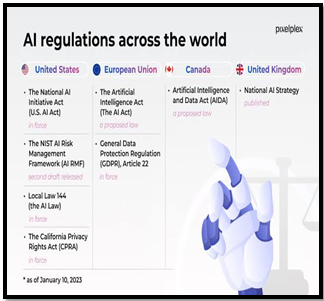REGULATING ARTIFICIAL INTELLIGENCE: BUILDING REGULATORY CAPABILITIES
Why in the News?
- US, EU, and UK have taken significant steps in regulating AI.
- Agreements, declarations, and global summits highlight the need for AI trust and safety.
Source: PixelPlex
What is Artificial Intelligence?
Artificial Intelligence (AI) refers to the development of computer systems capable of performing tasks that typically require human intelligence. This includes learning, problem-solving, language understanding, and adapting to new information, enhancing machines’ ability to emulate and automate intelligent behaviour.
Current AI Applications:
- Banks and credit card companies using AI for fraud detection and risk assessment.
- E-commerce employing AI for credit risk prediction and personalized services.
- Indian insurance industry adopting AI for risk management.
Scope and Impact of AI:
- Artificial Intelligence’s transformative potential in sectors like banking, telecommunications, and insurance necessitates a revaluation of regulatory capabilities.
- Generative AI products show vast applicability and a rapid enhancement in service quality.
- AI adoption may alter professional practices, including bookkeeping, accounting, and legal contracts.
- Professional bodies maintaining norms and practices may see a shift.
Challenges :
- Rapid evolution of AI requires regulatory skill-building.
- Governments, especially regulatory agencies, must match the pace of new risks from AI technology.
- Transitioning from an analog to a digital state demands a new set of capabilities.
- The challenge lies in developing the capability to build regulatory capabilities in AI.
- Sole reliance on private sector incentives for regulation in critical sectors like banking and insurance is inadequate.
Regulatory Agencies’ Response:
- RBI and SEBI developing AI tools for regulatory supervision.
- Need for regulators to prepare for potential transformative changes caused by AI.
Way Forward:
- Regulatory agencies need nimble skills to implement and evaluate AI regulations.
- Exploration of algorithmic auditing for AI models’ lifecycle understanding.
- Regulators need the capability to understand and evaluate algorithmic auditing and disclosure.
- Deep thinking required for systemic capability building.
- External collaborations with firms like McKinsey and Accenture for advanced analytics.
- Effective regulation facilitates market acceptance of AI products and services.

 Source: PixelPlex
Source: PixelPlex

